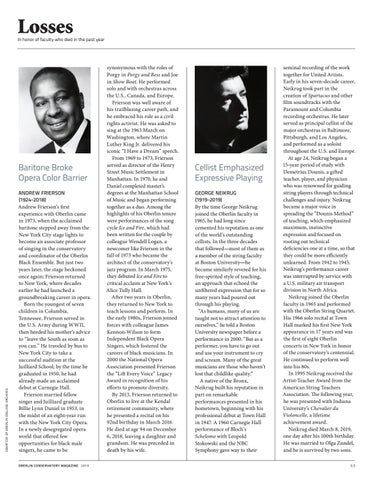Losses
In honor of faculty who died in the past year
COURTESY OF OBERLIN COLLEGE ARCHIVES
Baritone Broke Opera Color Barrier ANDREW FRIERSON (1924-2018) Andrew Frierson’s first experience with Oberlin came in 1973, when the acclaimed baritone stepped away from the New York City stage lights to become an associate professor of singing in the conservatory and coordinator of the Oberlin Black Ensemble. But just two years later, the stage beckoned once again; Frierson returned to New York, where decades earlier he had launched a groundbreaking career in opera. Born the youngest of seven children in Columbia, Tennessee, Frierson served in the U.S. Army during WWII, then heeded his mother’s advice to “leave the South as soon as you can.” He traveled by bus to New York City to take a successful audition at the Juilliard School; by the time he graduated in 1950, he had already made an acclaimed debut at Carnegie Hall. Frierson married fellow singer and Juilliard graduate Billie Lynn Daniel in 1953, in the midst of an eight-year run with the New York City Opera. In a newly desegregated opera world that offered few opportunities for black male singers, he came to be OBERLIN CONSERVATORY MAGAZINE 2019
synonymous with the roles of Porgy in Porgy and Bess and Joe in Show Boat. He performed solo and with orchestras across the U.S., Canada, and Europe. Frierson was well aware of his trailblazing career path, and he embraced his role as a civil rights activist. He was asked to sing at the 1963 March on Washington, where Martin Luther King Jr. delivered his iconic “I Have a Dream” speech. From 1969 to 1973, Frierson served as director of the Henry Street Music Settlement in Manhattan. In 1970, he and Daniel completed master’s degrees at the Manhattan School of Music and began performing together as a duo. Among the highlights of his Oberlin tenure were performances of the song cycle Ice and Fire, which had been written for the couple by colleague Wendell Logan, a newcomer like Frierson in the fall of 1973 who became the architect of the conservatory’s jazz program. In March 1975, they debuted Ice and Fire to critical acclaim at New York’s Alice Tully Hall. After two years in Oberlin, they returned to New York to teach lessons and perform. In the early 1980s, Frierson joined forces with colleague James Kennon-Wilson to form Independent Black Opera Singers, which fostered the careers of black musicians. In 2000 the National Opera Association presented Frierson the “Lift Every Voice” Legacy Award in recognition of his efforts to promote diversity. By 2013, Frierson returned to Oberlin to live at the Kendal retirement community, where he presented a recital on his 92nd birthday in March 2016. He died at age 94 on December 6, 2018, leaving a daughter and grandson. He was preceded in death by his wife.
Cellist Emphasized Expressive Playing GEORGE NEIKRUG (1919-2019) By the time George Neikrug joined the Oberlin faculty in 1965, he had long since cemented his reputation as one of the world’s outstanding cellists. In the three decades that followed—most of them as a member of the string faculty at Boston University—he became similarly revered for his free-spirited style of teaching, an approach that echoed the unfiltered expression that for so many years had poured out through his playing. “As humans, many of us are taught not to attract attention to ourselves,” he told a Boston University newspaper before a performance in 2000. “But as a performer, you have to go out and use your instrument to cry and scream. Many of the great musicians are those who haven’t lost that childlike quality.” A native of the Bronx, Neikrug built his reputation in part on remarkable performances presented in his hometown, beginning with his professional debut at Town Hall in 1947. A 1960 Carnegie Hall performance of Bloch’s Schelomo with Leopold Stokowski and the NBC Symphony gave way to their
seminal recording of the work together for United Artists. Early in his seven-decade career, Neikrug took part in the creation of Spartacus and other film soundtracks with the Paramount and Columbia recording orchestras. He later served as principal cellist of the major orchestras in Baltimore, Pittsburgh, and Los Angeles, and performed as a soloist throughout the U.S. and Europe. At age 24, Neikrug began a 15-year period of study with Demetrius Dounis, a gifted teacher, player, and physician who was renowned for guiding string players through technical challenges and injury. Neikrug became a major voice in spreading the “Dounis Method” of teaching, which emphasized maximum, instinctive expression and focused on rooting out technical deficiencies one at a time, so that they could be more efficiently unlearned. From 1942 to 1945, Neikrug’s performance career was interrupted by service with a U.S. military air transport division in North Africa. Neikrug joined the Oberlin faculty in 1965 and performed with the Oberlin String Quartet. His 1966 solo recital at Town Hall marked his first New York appearance in 17 years and was the first of eight Oberlin concerts in New York in honor of the conservatory’s centennial. He continued to perform well into his 80s. In 1995 Neikrug received the Artist-Teacher Award from the American String Teachers Association. The following year, he was presented with Indiana University’s Chevalier du Violoncelle, a lifetime achievement award. Neikrug died March 8, 2019, one day after his 100th birthday. He was married to Olga Zundel, and he is survived by two sons. 63
